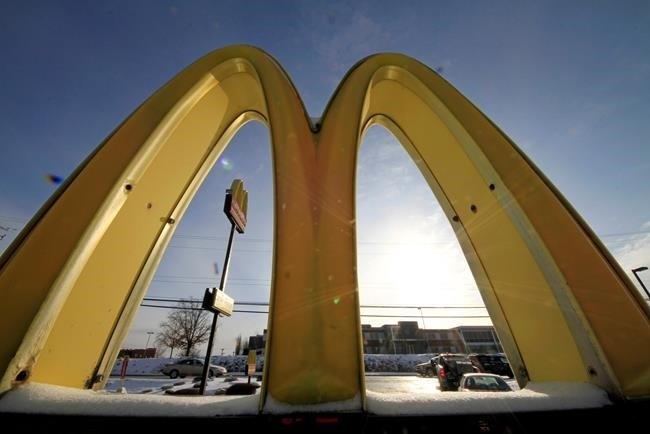
FILE - This Jan. 21, 2014 file photo, cars drive past the McDonald's Golden Arches logo at a McDonald's restaurant in Robinson Township, Pa. McDonald’s says it will switch to cage-free eggs in the U.S. and Canada over the next decade, marking the latest push under CEO Steve Easterbrook to try and reinvent the Big Mac maker as a “modern, progressive burger company.”
Image Credit: AP Photo/Gene J. Puskar, File
September 09, 2015 - 8:00 PM
NEW YORK, N.Y. - McDonald's restaurants in Canada and the United States are switching to so-called cage-free eggs over the next decade, marking the latest push under CEO Steve Easterbrook to try to reinvent the fast food chain as a "modern, progressive burger company."
Under pressure to revive slumping sales, McDonald's has already announced a number of changes since Easterbrook stepped into his role earlier this year.
In March, the fast-food giant said it would switch to chickens raised without most antibiotics. And in April, it said it would raise pay for workers at company-owned stores, which represent about 10 per cent of its domestic locations.
The decision to switch to cage-free eggs, known as free-range in Canada, signals a growing sensitivity among customers to animal welfare issues. That has been fuelled in part by places like Chipotle that have made animal welfare standards part of their marketing.
"McDonalds' announcement today is probably the most significant commitment towards cage-free eggs we've seen so far in Canada," Josey Kitson, Canadian executive director of World Animal Protection, said in a statement.
"They have the size and buying power to transform how eggs are produced here and ultimately improve the lives of millions of hens."
Kitson noted that most of the more than 300 million North American laying hens are kept in battery cages where each lives in a space smaller than an iPad with little room to move. In typical cage-free barns, hens are able to walk around, lay eggs in a nest box and perch.
"We know that Canadians want responsibly sourced food," Kitson said, adding that companies like McDonald's, with more than 1,400 outlets in Canada, "are starting to take notice."
Paul Shapiro, vice-president of farm and animal protection at the Humane Society of the United States, called Wednesday's announcement a "real watershed moment."
While cage-free doesn't mean cruelty-free or access to the outdoors, Shapiro said it's a substantial improvement from battery cages.
Among the companies that have said they will switch to cage-free eggs are Subway and Starbucks, although neither of those chains has laid out a timeline for when they expect the transition to be complete.
Already, McDonald's says it buys about 13 million cage-free eggs a year in the U.S. But that's still less than one per cent of the two billion eggs it uses annually to make menu items such as Egg McMuffins.
Overall, only about six per cent of the egg-laying hens in the U.S. are cage-free, according to the United Egg Producers. Chad Gregory, CEO of the industry group, said he expects that figure to climb.
John Betts, president and CEO of McDonald's Restaurants of Canada Ltd, said the decision "reinforces the focus we're placing on our food and menu to meet our guests' changing expectations."
McDonald's Canada, which buys about 120 million eggs from Canadian farmers each year, says it will begin the transition immediately.
"To meet the increased demand and ensure a sustainable supply of cage-free eggs, McDonald's Canada will work with industry stakeholders to identify the best path forward, while continuing to work within the Canadian supply management system," it said.
McDonald's is also likely to increase its egg purchasing over time; starting Oct. 6, the company plans to offer select breakfast items all day in the U.S., although the offering has so far not been extended to outlets in Canada.
— With files from The Canadian Press
News from © The Associated Press, 2015